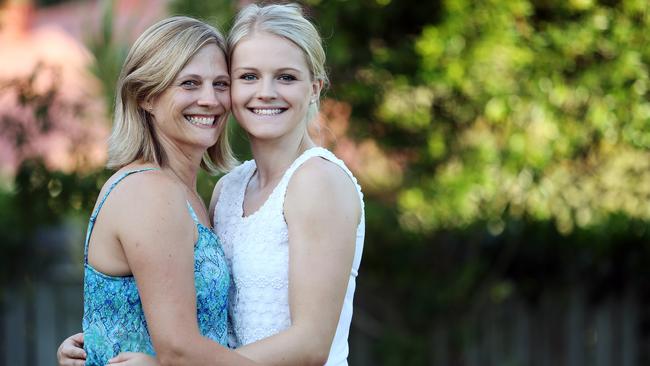Butterfly Foundation wants to present body image lessons to Queensland students to ward off development of eating disorders
QUEENSLAND students are missing out on lessons that other states are getting and now one of the country’s largest charitable organisations wants its messages in classrooms.
News
Don't miss out on the headlines from News. Followed categories will be added to My News.
QUEENSLAND children are missing out on lessons on body image and media literacy that students in other states are getting to help ward off the development of debilitating eating disorders.
Butterfly Foundation conducts programs in Victorian, NSW and South Australian schools to build self-esteem, dispel health, food and exercise myths, and learn how photoshop can be used in magazines. And the support group for people living with eating disorders wants to bring its messages to Queensland classrooms.
HOMES: Young woman’s plan to revolutionise eating disorder care in Australia
ANOREXIA: ‘It was like a monster took over me’
Queensland schools have no specific programs to educate students on body image and individual schools determine if they will address it.
Without mentioning eating disorders, Butterfly Foundation workshops use discussion groups, games, activities and presentations to work on body image, understand harmful dieting, build resilience and challenge social ideals around beauty, shape and size from Years 3 to 12.
Chief executive Christine Morgan said photoshop was a big part of the discussions, including that what was presented as the “ideal” in magazines “is all a bit of a con”.
“We will look at media literacy, helping young people better understand that all of this activity that happens across all kinds of media that pushes them toward this ideal body image – so for girls that’s the thin ideal and for boys it's the ripped, lean look – that it’s artificial,” she said.
“Often it’s photoshopped, it’s not healthy, it’s not the natural shape for most of us, and if you try and to do that through very disordered exercise or eating, you’re actually going to harm yourself.”
Students also learn diversity is a good thing, that not all people look the same, and are taught how to say no to risky behaviours.
Ms Morgan said a funding injection of $150,000 a year would significantly help in the rollout of education services in Queensland, while $500,000 was needed to go national.
An Education Department spokesman said healthy eating was taught in health and physical education classes, and Queensland schools had procedures around identifying students who may have mental health issues for referral to help services.
Ms Morgan said messages to parents were important so children who discussed body issues at school did not go home to mixed messages, where weight and shape was an unhealthy focus.
More than 55,000 Queenslanders under the age of 24 are thought to have an eating disorder.
Across all age groups, there are 191,000 Queenslanders and almost 950,000 Australians with anorexia nervosa, bulimia nervosa, binge eating disorder or other specified feeding and eating disorders, which are mental illnesses.
Nationally, 1941 people died last year from an eating disorder.
Ms Morgan said early intervention was key to stop the illnesses becoming chronic and long-term problems.
“We work with teachers, youth workers, school counsellors, people who work with young people to educate them about eating disorders, early warning signs and early intervention strategies,” she said.
She said more GPs needed specialist training to pick up the mental illnesses early and refer patients for the right help.
********************************************

MICHELLE Elphinstone did not realise the extent of her daughter’s eating disorder until she was told by a doctor her little girl’s weak heart could stop beating at any moment.
Courtney Hamlin was diagnosed with anorexia nervosa when she was 12 years old, a condition that affects thousands of Queensland families each year.
“The specialist lifted up her shirt and her spine was poking out through this sheath of skin, it was a nightmare,” Ms Elphinstone said. “It was heart wrenching, I would go to bed crying, feeling sick to my stomach, but I was not going to let my daughter die.”
As a voice inside her daughter’s head convinced her of a lie, that she was “fat and unworthy”, Courtney refused food, exercised obsessively and had to be raced to hospital after fainting at home, Ms Elphinstone said.
Now 19, Courtney said she had been “consumed” by the sickness and was unable to see she had a problem.
“I had lost so much weight I couldn’t even think properly,” Courtney said.
According to Ms Elphinstone, early intervention and a strong family support network was vital to Courtney’s recovery.
Butterfly Foundation chief executive Christine Morgan said eating disorders put families under extreme emotional and financial stress.
“Far too frequently, parents feel guilty and there should be no guilt associated with this illness,” she said.
According to Courtney, her mother was her saving grace.
“Mum was hard on me, which is why I recovered so quickly, but, at the time, I felt like she was being mean to me,” Courtney said.
“But if it wasn’t for my mum I would have died.”
Anyone needing support with body image or eating disorders is encouraged to contact the Butterfly National Eating Disorders Support line on 1800 33 4673 (1800 ED HOPE), Kids Helpline 24/7 crisis support on 1800 55 1800 (kidshelp.com.au) or Headspace on 1800 650 890 (headspace.org.au).


